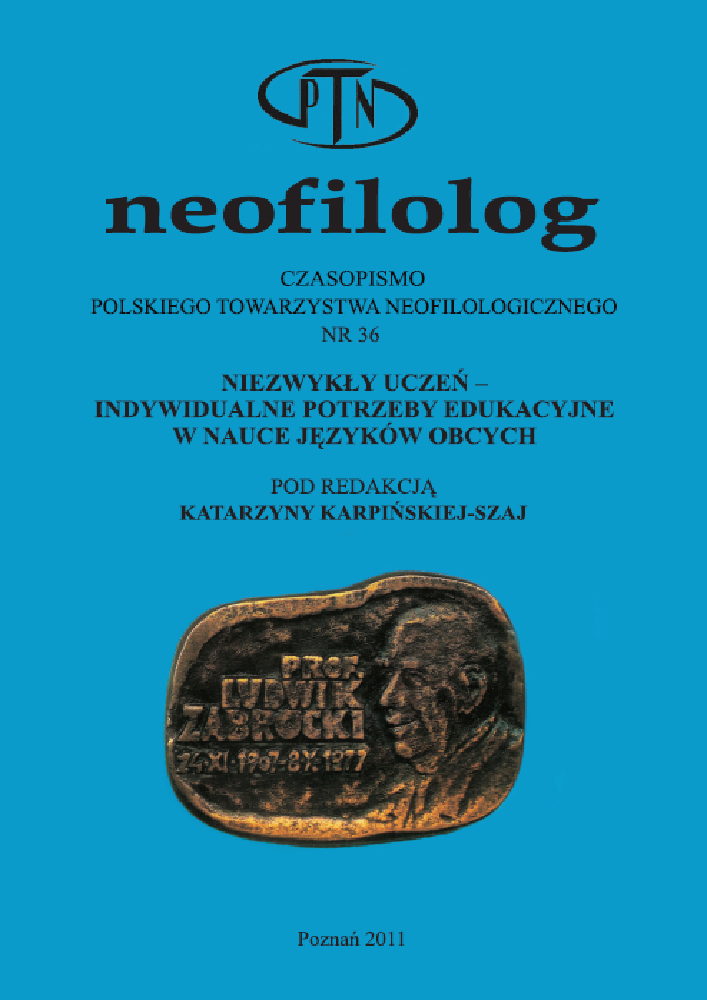Abstract
The paper is an appendix to gender studies and foreign language teaching. The author presents the interrelationships between gender differences and interaction in language classroom, motivation, achievements and learning strategies of boys and girls. She shows the complexity of these problems when she describes biological and social factors influencing the female and male behaviour and development of the pupils‟ cognitive skills. The assumption that underlies the basis of the text says, that Gend-er Studies should be considered in various fields of language education.
References
Blell, G. 1999. „Transgressing (Gender) Boundaries: Blickordnungen Und Blickwechsel”, w: Blell, G. i Krück, B. (red.). Mediale Textvielfalt Und Hand-lungskompetenz im Fremdsprachenunterricht. Frankfurt am Main: Peter Lang Verlag. 155-174.
Brannon, L. 2002. Psychologia rodzaju. Gdańsk: Gdańskie Wydawnictwo psychologiczne.
Decke-Cornill, H. 2007. „The Issue of Gender and Interaction in the L2 Class-room”, w: H. Decke-Cornill I L. Volkmann (red.). Gender Studies and Foreign Language Teaching, Tübingen: Gunter Narr Verlag. 77-90.
DESI Konsortium. 2006. Unterricht und Kompetenzerwerb in Deutsch und Englisch. Zentra-le Befunde der Studie Deutsch-Englisch-Schülerleistungen-International (DESI). Frank-furt/M: Deutsches Institut für Internationale Pädagogische Forschung.
Eurydice. 2010. Geschlechterunterschiede bei Bildungsresultaten. Derzeitige Situation und aktuel-le Maßnahmen in Europa. Brüssel: Exekutivagentur, audiovisuelles und Kultur.
Fliethmann, R. 2002. Weibliche Bildungsromane. Genderbewusste Literaturdidaktik im Englischunterricht. Tübingen: Gunter Narr Verlag.
Frey, E. 1997a. „Überlegungen zum geschlechtsspezifischen Deutschlernen (II)”. Zielsprache Deutsch 28, 99-106.
Frey, E. 1997b. „Überlegungen zum geschlechtsspezifischen Deutschlernen (I)”. Zielsprache Deutsch 28, 32-36.
Hertel, E. 1996. „Mädchen im Bundeswettbewerb Fremdsprachen. Sind Mäd-chen die besseren Fremdsprachenlerner”. Neusprachliche Mitteilungen aus Wissenschaft und Praxis 49, 34-38.
Górniakowska-Zwolak, E. 2004. „Nauczycielskie koncepcje ról społecznych kobiety i mężczyzny – czynnik wzmacniający czy osłabiający szanse rozwojowe dziewcząt i chłopców?”, w: M. Chomczyńska-Rubacha (red.). Płeć i rodzaj w edukacji. Łódź: Wyższa Szkoła Humanistyczno-Ekonomiczna. 85-92.
Grabowska, A. 2004. „Mózg kobiety – mózg męski. Diabeł tkwi w hormonach”, w: A. Kuczyńska i E. Dzikowska (red.). Zrozumieć płeć. Studia interdyscyplinarne II, Wrocław: Wydawnictwo Uniwersytetu Wrocławskiego. 179-195.
Komorowska, H. 1987. Sukces i niepowodzenie w nauce języka obcego. Warszawa: Wydawnictwa Szkolne i pedagogiczne.
Konarzewski. K. 1995. Sztuka nauczania. Warszawa: Wydawnictwo Naukowe PWN.
Kopciewicz, L. 2007. Rodzaj i edukacja. Studium fenomenologiczne z zastosowaniem teorii społecznej Pierre’a Bourdieu. Wrocław: Wydawnictwo Naukowe Dolnośląskiej Wyższej Edukacji TWP.
Kopciewicz, L. 2009. „Edukacja jako praktyka dominacji. Udział szkoły w wytwarzaniu kapitałów rodzajowych uczennic i uczniów”, w: L.
O różnicach między płciami w kontekście uczenia się i nauczania języków obcych
Kopciewicz i E. Zierkiewicz (red.). Koniec mitu niewinności? Płeć i seksualność w socjalizacji i edukacji. Warszawa: Eneteia. 13-28.
Muszyńska, E. 2004. „Warunki edukacji szkolnej dziewcząt i chłopców: różnice, ich przyczyny i skutki?”, w: M. Chomczyńska-Rubacha (red.). Płeć i rodzaj w edukacji. Łódź: Wyższa Szkoła Humanistyczno-Ekonomiczna. 44-52.
Nęcki, Z. 2000. Komunikacja międzyludzka. Kraków: Aktywna.
Oleksy, E. 1999. „Filmowe wizerunki kobiet południa USA”, [w:] Humanistyka i płeć, E. Pakszys, W. Heller (red.). Poznań: Wydawnictwo Naukowe Uniwersytetu im. Adama Mickiewicza.
Rang, L. K i Oxford, R. 2008. „Understanding EFL Learners‟ Strategy Use and Strategy Awareness”. Asian ELF Journal 10 (1). 7-32.
Reber A. S. 2000. Słownik Psychologii. Warszawa: Scholar.
Schmenk, B. 2002. Geschlechtsspezifisches Fremdsprachenlernen? Zur Konstruktion ge-schlechtstypischer Lerner- und Lernbilder in der Fremdsprachenforschung. Tübingen: Gunter Narr Verlag.
Schmenk, B. 2007. „Foreign Language Research and the Feminization of Lan-guage Learning”, w: H. Decke-Cornill I L. Volkmann (red.). Gender Studies and Foreign Language Teaching, Tübingen: Gunter Narr Verlag. 121-136.
Teske, D. 2007. „Gender Difference and the Cultural Component in Foreign Language Teaching” w: H. Decke-Cornill i L. Volkmann (red.). Gender Stu-dies and Foreign Language Teaching, Tübingen: Gunter Narr Verlag. 91-102.
License
Copyright (c) 2011 Agnieszka Rumianowska

This work is licensed under a Creative Commons Attribution-NoDerivatives 4.0 International License.
Authors
Authors of texts accepted for publication in Neofilolog are required to complete, sign and return to the Editorial team’s office the Agreement for granting a royalty-free license to works with a commitment to grant a CC sub-license.
Under the agreement, the authors of the texts published in Neofilolog grant Adam Mickiewicz University in Poznań a non-exclusive, royalty-free license and authorize the use of Attribution-NoDerivatives 4.0 International (CC BY-ND 4.0) Creative Commons sub-license.
The authors retain the right to the free disposal of the work.
Users
Interested Internet users are entitled to use works that have been published in Neofilolog since 2017, under the following conditions:
▪ attribution – obligation to provide, together with the distributed work, information about the authorship, title, source (link to the original work, DOI) and the license itself.
▪ no derivatives – the work must be preserved in its original form. Without the author's consent, it is not possible to distribute the modified work in the form of translations, publications, etc.
Copyrights are reserved for all texts published since 2017.
Miscellaneous
Adam Mickiewicz University in Poznań retains the property right as a whole (layout, graphic form, title, cover design, logo etc.).
